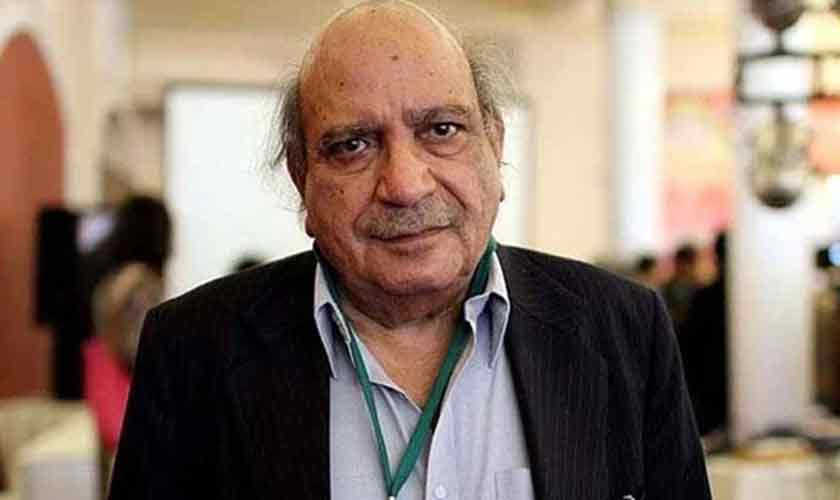T he first time I met IA Rehman in earnest was at the Viewpoint office, tucked away on Lawrence Road, sometime in the mid-to-late 1980s. It was thanks to Imran Aslam, Zohra Yusuf and Saneeya Hussain that I had begun writing for The Star Weekend , which was circulated with Dawn on Sundays. By then, I had long been familiar with Rehman sahib’s byline from The Pakistan Times – as far back as the 1960s – and I had had glimpses of him at public meetings, where he was much in demand.
But I did not come to know him personally until later. Viewpoint had been launched a decade earlier by Mazhar Ali Khan, with much of the groundwork laid at the Shah Hussain Institute on Lawrence Road. The institute itself had emerged after Shah Hussain College was nationalised by the Pakistan Peoples Party government in the early 1970s.

I had briefly been a lecturer there – teaching, as they say, on a wing and a prayer – and often saw Mazhar Ali Khan in discussion with Eric Cyprian, Amin Mughal and others. Viewpoint was born in a political season when the Peoples Party, like many parties in power in Pakistan, had begun to constrict spaces for freedom in various spheres. After martial law deposed the Peoples Party government, most civil liberties were shelved.
Somehow, Viewpoint managed to survive – adopting an editorial tone that was cautious and careful. Journalists developed the craft of saying more between the lines than in them, a skill essential for avoiding state censor. The policy was to say just enough – never too much.
It was a tightrope act: maintaining integrity without being shut down. On one of my early visits, I was asked to write for the weekly. I couldn’t refuse, though I had to write under a pseudonym due to my bureaucratic day job, which mostly involved approving routine notes, navigating turf wars among overstaffed subordinates and whiling away time with like-minded colleagues.
Viewpoint was, by contrast, a vital space – a last redoubt for journalists who had been blacklisted or barred elsewhere. It was a place of purpose and urgency. I didn’t know then that IA Rehman hailed from Hasanpur, not far from Panipat – where my family had lived for over seven centuries before fleeing to Pakistan during the Partition in 1947.
My own extended family had been divided over the idea of Partition; some migrated, others stayed. Rehman Sahib’s family suffered a far worse fate – most of his kin were massacred in the communal riots. He escaped, not because he was spared, but because he happened to be away from his hometown at the time.
He rebuilt his life in Pakistan. I only learnt of this tragedy much later, through his family, especially his son Ashaar Rehman – who would go on to be my editor for many years. Despite this harrowing personal history, IA Rehman never succumbed to bitterness.
He never spoke of that past, nor did he let it define him. Instead, he remained hopeful – committed to a vision of a world with economic justice and enough political space for all to breathe. He travelled to India frequently, but only in the final years of his life did he visit his hometown and the site of the slaughter.
He had an enormous capacity to tolerate, to coexist – even with those he entirely disagreed with . Viewpoint was more than a publication; it was a galaxy of brilliant, often hounded minds, seeking shelter in a modest, shed-like space. The printing press operated in the same premises.
The editor was the legendary Mazhar Ali Khan; IA Rehman, was in effect the working editor. Then there were Hussain Naqi, Zafar Iqbal Mirza, Shafqat Tanveer Mirza, Khawar Mumtaz, and of course, Alys Faiz. Later, Tahir Mirza also joined.
When Mazhar Sahib emerged from his office, these seasoned journalists would comically scramble like schoolchildren, feigning busyness. It was curious, given that Mazhar Sahib’s softest whisper could command a room. Viewpoint became a gathering point for politicians, writers, poets, journalists, architects, artistes, bohemians, diplomats – even the occasional musician.
Rehman Sahib was the anchor. He sat in a small, peeling-walls room – his own modest space – where he worked, received visitors and carried on deep, often important conversations, all at once. The din and distractions around him never broke his focus.
This, I thought, was the essence of journalism: the ability to write and reflect in the thick of life itself. He was a generous man, free of dogma, with a cultural outlook shaped more by inclusion than ideology. Unlike many who wore their beliefs on their sleeves, his were rounded, thoughtful and lived-in.
He was remarkably well-read – mention any book or author and you would receive instant validation, sometimes with a personal anecdote. He knew a staggering number of Indian and Pakistani writers, editors and intellectuals – many of them personally – and more whom he never spoke of. His wit, understated yet sharp, could outshine any professional humourist.
To me, he embodied the cultural sensibility of my elders – his accent, his inflection in Urdu, his gestures. I never saw him lose his temper. He had an enormous capacity to tolerate, to coexist – even with those he entirely disagreed with.
And his writing was always wholesome, balanced and complete. When the Peoples Party returned to power in 1988, he was appointed chief editor of The Pakistan Times , with Aziz Siddiqui as editor. I wrote for the paper during this time, while Viewpoint began to decline – changing ownership before eventually shutting down around 1990.
Fortunately, The Frontier Post launched from Lahore in 1989, and at Beena Sarwar’s urging, I shifted my allegiance to it. It blazed brightly for a few years before fading. Both Rehman Sahib and Siddiqui Sahib resigned from The Pakistan Times following the dismissal of the Peoples Party government in 1990 and were soon drawn into the orbit of Asma Jahangir, joining the Human Rights Commission of Pakistan, where they would leave another indelible legacy.
In 1993, I began contributing to The News on Friday (now The News on Sunday ), which was first published on April 29, 1994 – and continues to this day. April 12 marks the death anniversary of IA Rehman – a journalist, mentor and human rights giant whose grace, intellect, and moral clarity continue to shape our collective memory. The writer is a Lahore-based culture critic.
.
Entertainment

Among giants

T he first time I met IA Rehman in earnest was at the Viewpoint office, tucked away on Lawrence Road, sometime in the mid-to-late 1980s. It was thanks to Imran Aslam, Zohra Yusuf and Saneeya Hussain that I had begun writing for The Star Weekend, which was circulated with Dawn on Sundays. By...














